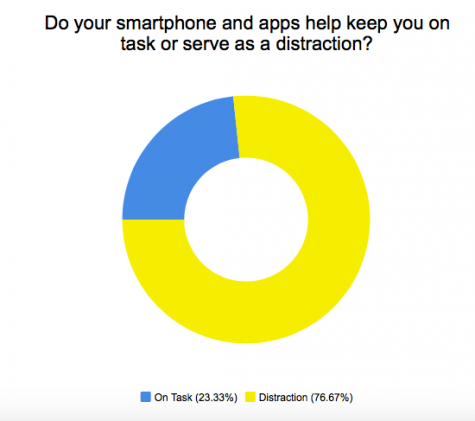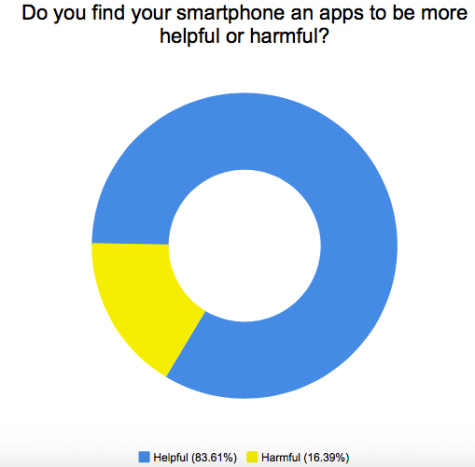Smartphones may help students more than they harm them
It is still unknown whether or not smartphones are wholly beneficial. They offer a huge variety of services on a daily basis, but many often attribute the rise in teenage mood disorders to the increased use of technology. Dr. Greg Ramey, Director of Mental Health at Dayton Children’s, has seen more and more young patients with disorders such as anxiety and depression in recent years. While he and other experts in his field do not know exactly what is the cause of the rise of these disorders, teenagers are experiencing higher levels of stress and it is evident to Ramey based on his patients.
“Experts say that the research is pretty clear that kids in [this] age range are more anxious and get more depressed,” Ramey said.
Because of the increase of both negative mental health issues and use technology on a daily basis, some believe that there is a correlation between the two.
“It’s easy for adults to say that cellphones are bad or that social media is bad. But the research says that they’re both good and bad,” Ramey said.
However, rather than being a negative, new technology offered by smartphones can actually be beneficial in many aspects. Ramey also agreed that technology as a whole can be a good thing for an individual.
“I am one that tends to be more pro technology than anti-technology,” Ramey said.
Smartphone apps offer many different tools, like communication, organization, reminders, and calendars.
“I use reminders all the time to help myself remember things I have to do. I find them very beneficial,” Nick Shafer (12) said.
Having a reminder that makes noise or vibrates could be very useful for some people who may tend to overlook a written reminder. Apps can also assist in other forms of organization, such as tracking healthy habits.
“[I use a] reminder app that rewards you doing your day to day tasks. It’s fun because you can go on quests and get treasure by doing your homework, which is a really good motivator,” Ben Collinson (11) said.
Turning mundane tasks into a fun game while also ensuring that you remember to do them every day is a great alternative if paper and pencil charts and agendas don’t tend to serve your needs. While technology may be a distraction for some, it may actually benefit others by providing a more engaging way to take care of daily tasks. Along with aiding organization, technology can make sharing information far more convenient.
“I use Google calendar and my whole family uses it so I can easily see who’s doing what each day. I use it a lot to make sure I am not forgetting something I planned,” Brenna Campbell (12) said.
Rather than using a paper calendar that is only accessible wherever the calendar is, the information can be accessed wherever a phone is. Social media can also allow people to communicate far easier than any other means in the past.
“I have a lot of friends that live an hour or so away and it’s really helpful for keeping in touch,” Collinson said.
If someone has long distance friends or family members, or if they find that making new friends in real life to be stressful and unproductive, using social media to make connections can be very beneficial. Ramey echoed these points in his interview.
“People use social media as a way to connect with other kids,” Ramey said. “They use it for emotional support. They use it to make friends. They use it because it’s fun and in a lot of ways it’s pretty cool. And the experts say that all those things I’ve said are true.”
Despite all of this, it’s often argued that social media is bad for people. While Ramey does believe that the benefits still stand, he does agree that there are some negatives.
“The downside [of social media] is that people your age are constantly comparing yourselves to other people, you are constantly looking for reassurance and affirmation, and more and more you are spending time not talking and interacting in real time, and instead you are using your thumbs to communicate through technology,” Ramey said.
Ramey, as well as many others in the field, say that becoming fixated on cell phones is harmful for anyone, no matter their age.
One major argument against social media and the regular use of technology is the distractions that some applications may cause. Many people mindlessly scroll through Instagram or Facebook, or spend hours on Snapchat when they have plenty of other things they may need to be doing.
“I do get distracted by social media sometimes when I need to be productive on things like homework,” Campbell said. Some people may also feel compelled to constantly be on their phones.
“Some kids [shut off their] phone and don’t look at it until the following day. Other kids almost seem compelled to be checking their phones regularly and they’re almost addicted to it,” Ramey said.
Others also find that social media and cell phones are a major stressor in their life. During his interview, Ramey spoke about a survey of girls’ biggest sources of pressure in their lives, reporting that school was the biggest source of stress, but social media was the second.
“More and more young people [have a] a higher drive to perfectionism,” Ramey said.
Whether or not social media is the sole cause of the rise of perfectionism in teens and young adults, Ramey noted that this is harmful no matter what.
“By definition perfectionism is something you could never achieve so when you’re striving for something you can’t achieve that’s one of the factors that leads to anxiety and depression,” Ramey said.
Social media’s benefits seem fun, but some may wonder whether or not it is worth fighting the other factors that it may bring. Ramey says that it depends on the individual, and figuring out how to utilize it to suit one’s own personal needs.
“It’s the whole issue of control. Does the technology control you or do you control the technology?” Ramey said.
Overall, whether or not smartphones will help an individual just depends on their lifestyle and how they may use them.
“I feel it helps me more than it hurts me. I’m very scatterbrained and will forget things at times and it keeps me in check because I’m able to remind myself of things multiple times throughout the day. It [also] serves well as entertainment,” Collinson said.
The technology we used every day has become vital to interacting with the world whether or not it is personally beneficial.
“I can’t live without my phone or the apps on it but I might be better off without it,” Campbell said.


Like most things in life, the key to making sure technology is helping rather than hindering everyday life is maintaining balance.
“The biggest message I think is for young people to avoid the extreme of either staying away from technology, because technology can help you a great deal, or going to the other extreme of being so connected with technology that you find yourself disconnected from other people,” Ramey said.
Technology can help connect people with others, or it can inhibit personal interactions. Fostering loving interpersonal relationships is the key to keeping a healthy, happy life, even in the presence of technology. If a group of people are hanging out, they should be engaged with each other rather than whatever is on their phones.
“When I’m with my friends I try not to pull out my phone, because I’ve heard from many sources that having your phone out with your friends subconsciously gives the impression that you aren’t invested in what they’re saying and I don’t want that,” Shafer said.
Ramey stressed that these connections, whether it be through friendships, family, or any other kind of relationship, are the most important part of maintaining balance.
“Recognize that at the end of the day that what gives meaning to people’s lives is not interacting with a computer, but being in genuine, real, caring, loving relationships with other people,” Ramey said. “If [technology] is getting in the way of those relationships then it’s something you need to be very careful of.”







